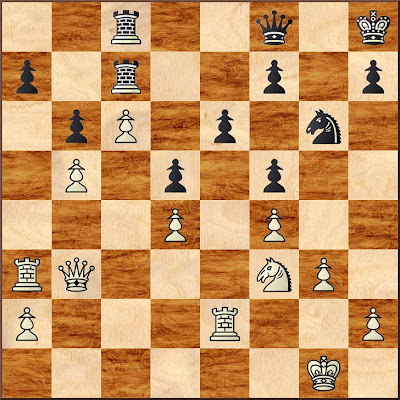White to move
White has a winning tactic that is not terribly difficult to spot. I reached my fantasy position, but had overlooked this tactic.
The game ended 42.Rxb6 axb6 43.Qxa8 Qb4 44.Rb3 Qc4 45.Qb8 Qf1+ 46.Ng1 1-0
This losing fantasy position was imagined ten moves earlier.
Black to move
I considered 32...a5 offering White a choice of weakened pawns on the queenside, or a position that is completely locked down. This pawn thrust remained a possibility for several moves longer. I did not play it because I observed Rxb6 only after White's rook was firmly planted on a6.
The game continued:
32...Qh6 with the idea of provoking 33.g3 Qf8 34.Qb3 Qg7
My fantasy included this transparent tactic.
35.Kh1
Black to move
Now might have been an opportune time for 35...a5. It was certainly time to reassess my fantasy position. Instead, I defended against a phantom threat on f7. It was my last chance to save the game.
35...h6 36.Ra6 Qf8 37.Qa4 Qe7 38.Re3 Kg7 39.Qa3 Re8 40.Qa4 Rd8 41.Ra3 Ra8 and we reached my flawed fantasy position (see the first diagram).
During post-game analysis, Nikolay Bulakh and I examined 35...a5 36.bxa6 Rxc6 and it seemed that both sides had chances. Congratulations to Nikolay for scoring his first standard rated tournament win against me.
Note: After writing my assessment of the end of this game, I ran some computer analysis. Stockfish 2.3 believes that White is already winning in the second diagram (the earliest). After my possibly dubious plan from limited home preparation that gave me the doubled f-pawns, I had equal chances for most of the middle game. There were several points where my imagination (finding the plan) and calculation (assessing the consequences) failed me. This game was my second loss in the Spokane Chess Club Championship. The last time that I lost two games in one event was the 2011 Taxing Quads. That event dropped my rating from 1839 to 1824 ("Playing Crazy" offers my only win from that event). The winter club championship will drop my rating to mid-1900s.
*Silman did not invent the term, but it was from his writing that I became acquainted the concept and began to apply it in my thinking. See How to Reassess Your Chess, 3rd ed (Los Angeles: Siles Press, 1993), 30ff.















No comments:
Post a Comment